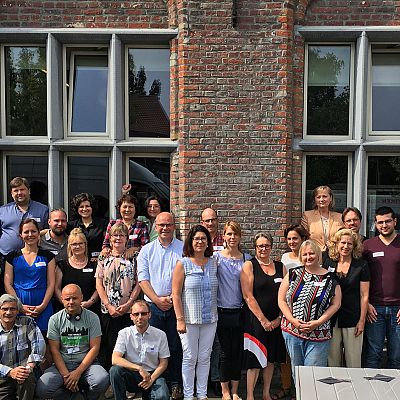"It is our aspiration that all people of Amsterdam with disabilities have an opportunity to become participants in our city"
European learning network
The knowledge and innovative ideas we gain in cooperation with ENSIE, we share with the social entrepreneurs in our own network. Think of the development of cooperative companies (Italy), the covenants between firms and municipality (Spain) or innovative development around SW companies (Belgium).
Corine van de Burgt has been asked to become vice-chairman. She likes to do this; the value of the ENSIE network is high and the exchange with other platforms of social entrepreneurs in the various European Member States is inspiring.
Why is De Omslag member of ENSIE
ENSIE is an experienced network of national and regional platform organizations of social enterprises. Within the organization of ENSIE and her members, there is much knowledge and know-how about strengthening social enterprises, especially the Work Integration Social Enterprises (WISEs).
ENSIE has excellent relations with members of the European Commission and the various Directorates General.
The European lobby by ENSIE ensures that social entrepreneurship and Work Integration Social Enterprises remain an instrument for achieving the European Commission’s social objectives. ENSIE supports the strength of its members from this lobby so that an improved social enterprise ecosystem can also be used at national and regional level.
The exchange between Brussels and national or regional policy strengthens and inspires. De Omslag brings in the Amsterdam practical examples. Together we work on, for example, improving procurement policies or tackling incentive tax rates.
By looking into eachothers kitchen we see opportunities and practices that would be missed without this European network. Amsterdam can thus benefit from the experiences in other European major cities (Vienna, Barcelona, Ghent).
ENSIE members meeting 13 and 14 June
This meeting was the opportunity to discuss the ENSIE’s strategic objectives and activities. On the agenda, the internal organization, but especially the relationship with the European Commission, was central.
European Policy Agreement
On the second day ENSIE invited stakeholders to discuss the current European trends: the European pillar of social rights (European Pillar on Social Rights) and the following steps for Work Integration Social Enterprises.
Some members of the European Commission came along to explain policy and gain input from members.
Patricia Pedelabat, European Commission, gave an extensive explanation of the European Pillar of Social Rights. It concerns 20 directives and rights that are important in the European Commission’s social objectives. Download the presentation
ENSIE strives to pay attention to the role that the social economy can play in this. The exchange at the meeting is an important occasion for this: it strongly supports and strengthens the position of social companies.
The latter is done by Risto Ravio, senior expert for the European Commission, DG Employment, Social Affairs and Inclusion. For years, he has been the expert in social affairs. As a senior expert, he is a member of many committees, including the GECES, and has contributed to the advice that emerges.
Download here samenvatting-geces_nl.pdf or view all GECES documents
In a presentation he showed the possibilities within the European Commission for strengthening WISEs, for example through knowledge of business models, access to funds etc.
Download the presentation.
Committees develop guidelines for encouraging social entrepreneurs and creating the right ecosystem for that. Risto Ravio is a good ambassador for social entrepreneurship in Brussels and ensures that the social economy remains on the agenda.
Work visit
After the event, all participants visited the business social economy in Ghent Social Economy: The former factory site of the textile giant UCO. This is an interesting partnership between the local WISEs and the city of Ghent. The area is developed with emphatically the choice for just social objectives.

